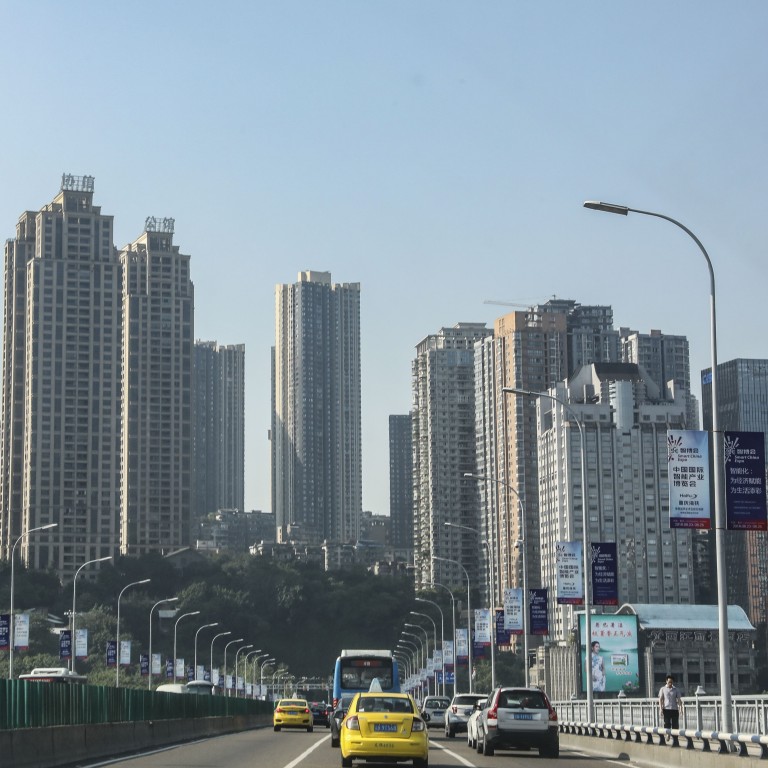
China sounds a clarion call for a property tax, causing real estate stocks to slump, even if the legal basis for the tax is years away
- The legislation for property taxes has been listed on National People’s Congress work agenda since 2015, but so far no draft has been proposed, thus little detail is known
- Detail matters because a property tax could be toothless if a large exemption area is set, and the tax rate is low, analysts said
A clarion call by China’s legislature to implement a tax on the nation’s property holdings scared investors into dumping real estate developers’ shares, even if the legal foundation for enacting a nationwide levy is at least five years away.
The Shanghai Property Index, which tracks 25 real estate developers on the Shanghai Composite Index, slumped 4.3 per cent on Friday in its biggest one-day percentage decline since October 11, causing at least two of the stocks to fall by their 10 per cent daily limit.
The scare was sparked when Li Zhanshu, the chairman of the National People’s Congress Standing Committee said on Friday that the legislature would focus its energy on drafting several pieces of law this year, including the legal foundations for a property tax.
Chinese Premier Li Keqiang said during his annual report earlier last week that the government would “steadily push forward” the legislation, without elaborating.
A tax on real estate holdings, the largest store of wealth for Chinese citizens, would offer local authorities a new revenue source and wean them off the land sales that contribute to the upwards spiralling of home prices. It would also affect hundreds of millions of property owners in a market where sales topped 15 trillion yuan (US$2.23 trillion) last year, surpassing the United States.
Still, details are sketchy, and the timing and content of the tax has become a recurring guessing game every March when the Chinese legislature meets in Beijing for its annual deliberations.
“It is meaningless to assess the impact of the tax because even a draft of the law that underpins the levy is missing,” said Zhang Bin, a fiscal and tax research at the Chinese Academy of Social Sciences, a state-run think tank.
“We don’t know whether the tax will be levied on all homeowners, or just those with the third or fourth home. We don’t know the tax rate, or even whether there will be a unified, national rate.”
For one thing, the process of drafting a law must go through several readings in the Chinese legislature, before it goes for public feedback.
Even after the bill is enacted into law, local authorities may ultimately have the discretion on how it is implemented, or how levies are collected.
Already, local authorities in Shandong, Guangzhou and Shenzhen have taken the discretion in recent months to loosen some of the market-cooling measures imposed since 2017 on China’s property prices and sales.
The best guess is that legislation will be in place by 2023 when the current legislature ends its term, before the enactment of the levy follows, according to a report by Citic Securities.
]]>
Even if there is legal basis for collecting the tax, its roll-out may come in phases, as some provinces, municipalities or cities are selected as test cases, said Zhang Hongwei, research director of TopSur, a property consultancy. Shanghai and Chongqing, two of China’s four municipalities, have already introduced pilot programmes on property taxes.
That would mean another four to six years before the levy is rolled out nationwide.
“They may also consider the property market sentiment, avoiding to publish it in a down cycle like now,” Zhang said.

For now, the guessing game continues. A mere 26.3 per cent of existing homes could be subject to tax if an exemption rate of 30 square metres (322 square feet) per head is set, according to an estimate by the research firm under China Evergrande Group, one of the country’s biggest property developers, owned by an entrepreneur who’s also an adviser to the legislature.
If the tax rate is set at 1 per cent, the total revenue generated would amount to 1.96 trillion yuan, or 37.6 per cent of local government’s land sale receipt, the Evergrande researchers said.
“Legislation of a property law was listed on agenda for the first time in 2015, but year after year there had been no real draft submitted … which shows they have not reached consensus on lots of details,” said Eric Zhang of investment bank CICC. “Even if a law was enacted, it is miles away from implementation.”


